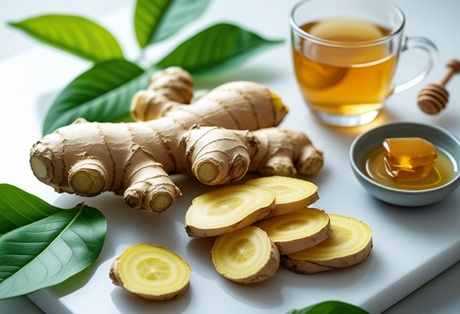What Are the Benefits of Ginger: Health Advantages & Usage Tips
Ginger stands out as one of nature’s most versatile healing spices, offering a remarkable range of health benefits that extend far beyond its culinary uses. This aromatic root contains powerful bioactive compounds, particularly gingerol, which provide anti-inflammatory, antioxidant, and anti-nausea properties that can support various aspects of human health.

Research shows that ginger may help reduce nausea, support digestive health, manage blood sugar levels, alleviate menstrual pain, and provide anti-inflammatory effects that could benefit conditions like osteoarthritis. The health benefits of ginger span from immediate relief for motion sickness to potential long-term support for heart health and immune function.
Whether consumed as fresh root, dried powder, or brewed into tea, ginger offers accessible wellness support for people seeking natural approaches to health maintenance. Understanding how to properly use this golden root and incorporate it safely into daily routines can unlock its full therapeutic potential.
Key Takeaways
- Ginger contains gingerol and other bioactive compounds that provide anti-inflammatory, antioxidant, and anti-nausea properties
- Scientific research supports ginger’s effectiveness for reducing nausea, supporting digestion, managing blood sugar, and alleviating pain
- Ginger is generally safe for most people when consumed in moderation, though pregnant individuals should consult healthcare providers before use
What Is Ginger?

Ginger is a flowering plant from the Zingiberaceae family, scientifically known as Zingiber officinale, with its underground stem serving as both a popular spice and traditional medicine. The plant contains powerful bioactive compounds like gingerol that contribute to its distinctive flavor and potential health properties.
Botanical Origins and Varieties
Ginger originates from Southeast Asia and belongs to the Zingiberaceae family. It shares close botanical relationships with turmeric, cardamom, and galangal.
The rhizome, or underground part of the stem, serves as the commonly used portion. This knobby, tan-colored structure is often called ginger root, though it’s technically not a true root.
Zingiber officinale represents the most widely cultivated species. Several varieties exist, including young ginger with thin skin and mature ginger with thicker, more fibrous skin.
The plant produces yellow-green flowers and can grow up to four feet tall. Commercial cultivation occurs primarily in tropical and subtropical regions including India, China, Nigeria, and Thailand.
Nutritional Profile and Key Compounds
Fresh ginger contains modest amounts of essential nutrients. One teaspoon of raw ginger provides 0.1 mg of vitamin C, plus small quantities of calcium, magnesium, and other minerals.
The primary bioactive compound is gingerol, specifically 6-gingerol. Gingerol has powerful anti-inflammatory and antioxidant effects and serves as the main source of ginger’s potential medicinal properties.
When dried, gingerol converts to zingerone, which provides a different flavor profile. Other important compounds include various gingerols and shogaols, particularly 6-shogaol in dried forms.
These compounds contribute minimal calories but deliver significant bioactive potential. The nutritional profile varies between fresh and processed forms.
Forms and Culinary Uses
Fresh ginger offers the highest concentration of active compounds and provides a sharp, pungent flavor. It works well grated, minced, or sliced in cooking applications.
Dried ginger and ginger powder contain concentrated flavors with slightly different compound profiles. Ginger powder has similar health benefits to fresh ginger, but slightly less anti-inflammatory impact.
Pickled ginger, commonly served with sushi, undergoes fermentation that alters its nutritional content. Crystallized or candied ginger contains added sugars but retains some beneficial compounds.
Beverage forms include ginger ale and ginger beer, though commercial versions often contain minimal actual ginger. Fresh ginger tea preserves more active compounds than processed alternatives.
Each form offers different concentrations of gingerols, zingerone, and other bioactive substances depending on processing methods.
Core Health Benefits of Ginger

Ginger’s primary therapeutic properties stem from its bioactive compounds, particularly gingerol, which provides potent anti-inflammatory and antioxidant effects. These compounds work together to address pain, support digestive function, and reduce inflammation throughout the body.
Anti-Inflammatory and Antioxidant Effects
Gingerol serves as the main bioactive compound responsible for ginger’s medicinal properties. This compound delivers powerful anti-inflammatory and antioxidant effects that help reduce oxidative stress in the body.
The anti-inflammatory properties of ginger work by inhibiting inflammatory pathways. Research demonstrates that gingerol can significantly reduce markers of inflammation throughout the body.
Oxidative stress occurs when free radicals overwhelm the body’s natural defense systems. Ginger’s antioxidant compounds help combat this imbalance by neutralizing harmful free radicals.
Key Anti-Inflammatory Benefits:
- Reduces inflammatory markers in blood tests
- Protects cells from oxidative damage
- Supports overall immune system function
- May help prevent chronic inflammatory conditions
The antioxidants in ginger include gingerols, shogaols, and other phenolic compounds. These work synergistically to provide comprehensive cellular protection against damage from environmental toxins and normal metabolic processes.
Pain Relief and Inflammatory Conditions
Ginger demonstrates significant effectiveness in managing various types of pain and inflammatory conditions. Research shows it may help reduce osteoarthritis pain, particularly in joints affected by degeneration and stiffness.
Arthritis and Joint Pain:
Osteoarthritis involves joint degeneration that leads to pain and reduced mobility. Studies indicate that ginger supplementation can help reduce joint pain intensity and improve function in people with osteoarthritis.
Menstrual Pain Relief:
Ginger shows effectiveness comparable to mefenamic acid and ibuprofen for treating menstrual cramps. Women experiencing dysmenorrhea may find relief through regular ginger consumption.
The pain-relieving mechanisms involve blocking inflammatory pathways that contribute to pain sensation. Ginger compounds interact with pain receptors and reduce the production of inflammatory substances that cause discomfort.
Muscle soreness and headaches may also respond to ginger’s anti-inflammatory effects. The compounds help reduce swelling and inflammation that contribute to these common pain conditions.
Digestive Health Support
Ginger supports digestive health by promoting gastric motility and stimulating digestive juices. These actions help food move more efficiently through the gastrointestinal tract.
IBS and Digestive Disorders:
People with irritable bowel syndrome may benefit from ginger’s ability to reduce gastrointestinal discomfort. The spice helps manage symptoms by promoting better digestive function and reducing inflammation in the digestive tract.
Common Digestive Benefits:
- Reduces bloating and gas
- Alleviates nausea and morning sickness
- Improves overall digestion
- May help prevent stomach ulcers
Gastric motility improvements help prevent food from remaining too long in the stomach. This reduces the likelihood of experiencing heartburn, bloating, and other digestive discomforts.
Daily doses of 2000 mg may help reduce inflammation in the digestive system while protecting against ulceration. However, large amounts can sometimes cause diarrhea or stomach irritation in sensitive individuals.
Ginger for Nausea and Motion Sickness
Ginger contains active compounds called gingerols that effectively reduce various types of nausea by influencing serotonin receptors and enhancing gastric motility. Research indicates that doses of 1 to 1.5 grams can significantly reduce nausea symptoms, particularly for pregnancy-related morning sickness, chemotherapy treatments, and travel-related motion sickness.
Morning Sickness and Pregnancy
Ginger serves as a safe and effective anti-nausea remedy for pregnant women experiencing morning sickness. Healthcare professionals frequently recommend it as a first-line treatment due to its proven safety profile during pregnancy.
Studies demonstrate that ginger can reduce both nausea severity and vomiting episodes in early pregnancy. Healthcare professionals may recommend ginger for nausea relief, especially during pregnancy.
The recommended dosage for pregnant women ranges from 250mg to 1000mg daily, divided into smaller doses. Fresh ginger tea, ginger capsules, or crystallized ginger all provide effective relief.
Safe forms for pregnancy:
- Fresh ginger tea (1-2 cups daily)
- Standardized ginger capsules (250mg, 2-4 times daily)
- Crystallized ginger pieces
Most women notice improvement within 2-4 days of consistent use. The anti-nausea effects work by accelerating gastric emptying and reducing stomach contractions that trigger nausea sensations.
Chemotherapy and Postoperative Nausea
Ginger provides complementary relief for chemotherapy-induced nausea when used alongside conventional anti-nausea medications. Clinical trials indicate that divided lower daily dosage of 1500 mg ginger is beneficial for nausea relief.
Cancer patients often experience anticipatory nausea before treatments and delayed nausea afterward. Ginger helps reduce both types by modulating neurotransmitter pathways involved in nausea perception.
For postoperative nausea, ginger taken before surgery can reduce the incidence and severity of post-anesthesia nausea. However, there’s mixed evidence about whether it helps with nausea caused by surgery or chemotherapy.
Patients should consult oncologists before adding ginger supplements, as it may interact with certain medications or affect blood clotting parameters.
Motion Sickness Prevention
Ginger has been used as a treatment for motion sickness for centuries and remains one of the most effective natural remedies available. The bioactive compounds prevent the sensory mismatch that triggers motion-related nausea.
For optimal effectiveness, individuals should take ginger 30-60 minutes before travel. The anti-nausea effects typically last 3-4 hours, making it suitable for most travel durations.
Effective dosing for motion sickness:
- 500-1000mg ginger extract
- 2-4 grams fresh ginger
- 1-2 cups strong ginger tea
Ginger works particularly well for car travel, boat trips, and amusement park rides. Ginger is also effective at relieving motion sickness by enhancing gastric motility and reducing vestibular sensitivity.
Some individuals find ginger more effective than over-the-counter motion sickness medications, with fewer side effects like drowsiness.
Ginger’s Role in Blood Sugar and Heart Health
Ginger demonstrates significant effects on glucose metabolism and cardiovascular function through its bioactive compounds. Research shows measurable improvements in long-term blood sugar control and various heart health markers.
Blood Sugar Regulation and Diabetes
Studies examining ginger’s impact on type 2 diabetes reveal promising results for glucose management. A comprehensive analysis of eight randomized trials involving 454 participants found that ginger significantly improved HbA1c levels over 8-12 weeks of supplementation.
The research showed no significant changes in fasting blood sugar levels with daily ginger consumption. However, HbA1c values improved meaningfully from baseline measurements. This indicates better long-term glucose control over 1-2 month periods.
Effective dosing ranges from 1600-4000 mg daily for therapeutic benefits. The improvements in HbA1c suggest enhanced insulin sensitivity and glucose metabolism. These effects occur without significant adverse reactions in most individuals.
Participants in ginger studies typically had baseline HbA1c levels between 6.90% and 8.40%. The natural compounds in ginger appear to reduce inflammation, oxidative stress, and insulin resistance that contribute to diabetes complications.
Cholesterol and Triglycerides
Ginger consumption influences lipid profiles in ways that benefit cardiovascular health. Research indicates that regular ginger intake can lower cholesterol levels and reduce harmful lipid markers.
The spice appears particularly effective at decreasing LDL cholesterol levels. This “bad” cholesterol contributes to arterial plaque formation when elevated. Ginger’s anti-inflammatory properties may help prevent lipid oxidation that damages blood vessels.
Triglyceride levels also respond positively to ginger supplementation. High triglycerides increase cardiovascular disease risk and often accompany diabetes. The compounds in ginger help regulate fat metabolism and storage.
Studies suggest these lipid improvements occur alongside better glucose control. This dual benefit makes ginger particularly valuable for individuals with metabolic syndrome. Weight management may also improve through enhanced metabolism.
Blood Pressure and Circulation
Ginger demonstrates measurable effects on blood pressure regulation and circulatory function. Research shows that ginger can reduce both systolic and diastolic blood pressure compared to control groups.
The cardiovascular benefits extend beyond simple pressure reduction. Ginger’s compounds help improve overall circulation throughout the body. This enhanced blood flow supports organ function and tissue health.
Anti-inflammatory effects play a key role in these circulatory improvements. Chronic inflammation damages blood vessel walls and impairs normal function. Ginger’s natural compounds help reduce this inflammatory burden.
The spice may also help prevent blood clot formation through mild anticoagulant effects. Better circulation combined with reduced inflammation creates favorable conditions for heart health. These effects complement ginger’s benefits for blood sugar and cholesterol management.
Other Notable Medicinal Properties
Ginger contains compounds like gingerol and shogaol that provide antimicrobial effects against harmful bacteria and fungi while supporting immune function. Research suggests these bioactive compounds may also protect brain cells from damage and potentially inhibit cancer cell growth.
Immune System and Antimicrobial Effects
Ginger’s antimicrobial properties make it effective against various bacterial and fungal pathogens. Studies show that ginger compounds can fight Staphylococcus aureus, which causes skin and bloodstream infections, and Escherichia coli, a common cause of intestinal infections.
The root also demonstrates antifungal activity against Candida albicans, which causes oral thrush and vaginal yeast infections. Ginger’s antimicrobial properties could make it useful for fighting bacterial and fungal infections naturally.
These antimicrobial effects may help strengthen the immune system by reducing the bacterial load in the body. The anti-inflammatory compounds in ginger also support immune function by reducing chronic inflammation that can weaken immune responses.
However, more human studies are needed to fully understand how ginger supplementation affects overall immune system performance and infection prevention.
Cognitive Health and Neuroprotection
Ginger contains compounds that may protect brain cells from age-related damage and cognitive decline. The antioxidant properties of gingerol help reduce oxidative stress, which contributes to neurodegenerative diseases like Alzheimer’s disease and Parkinson’s disease.
Research indicates that 6-shogaol and 6-gingerol compounds in ginger may help prevent degenerative conditions affecting the nervous system. Studies suggest these compounds may help prevent degenerative conditions such as Parkinson’s disease, Alzheimer’s disease, and multiple sclerosis.
Chronic inflammation plays a key role in Alzheimer’s development and age-related cognitive decline. Ginger’s anti-inflammatory effects may help protect against these processes, though more clinical research is necessary.
The neuroprotective benefits appear strongest when ginger is consumed regularly over time, allowing the bioactive compounds to accumulate and provide sustained protection against brain cell damage.
Potential Anticancer Effects
Ginger may possess anticancer properties due to its high concentration of antioxidant and anti-inflammatory compounds. Laboratory studies suggest that gingerol and related compounds can inhibit cancer cell growth and promote cancer cell death.
Research shows particular promise for preventing colorectal cancer. Studies indicate that 2000 mg of ginger daily could help protect against colorectal cancer development through its anti-inflammatory mechanisms.
However, clinical trials in humans have produced inconsistent results regarding ginger’s anticancer effects. Most studies relating to ginger and cancer risk have not involved humans, and more research is necessary to confirm these potential benefits.
The compounds in ginger may work by reducing inflammation, neutralizing free radicals, and interfering with cellular processes that promote tumor growth. While promising, these effects require further investigation in human populations.
How to Use and Incorporate Ginger
Ginger can be consumed in multiple forms ranging from fresh root to concentrated supplements. Each form offers different potency levels and preparation methods for various culinary and therapeutic applications.
Fresh, Dried, and Powdered Forms
Fresh ginger root provides the most potent flavor and highest concentration of active compounds. People can grate, slice, or mince fresh ginger for cooking applications.
Fresh ginger preparation methods:
- Peel with a spoon edge to remove thin skin
- Grate using a microplane for fine texture
- Slice thinly for stir-fries and soups
- Mash into paste for marinades
Dried ginger offers concentrated flavor with longer shelf life. It works well in baking and spice blends but provides less zingy heat than fresh varieties.
Ginger powder delivers convenience for baking and seasoning. One teaspoon of powder equals approximately one tablespoon of fresh grated ginger. The powder form integrates easily into dry rubs, baked goods, and smoothies.
Storage recommendations:
- Fresh ginger: Refrigerate unpeeled for 3 weeks
- Dried ginger: Store in airtight containers for 2-3 years
- Ginger powder: Keep sealed and dry for 2-4 years
Supplements, Teas, and Beverages
Ginger supplements provide standardized doses typically ranging from 250mg to 1000mg per capsule. These concentrated forms offer therapeutic benefits without the strong taste.
Ginger tea preparation involves steeping fresh sliced ginger in boiling water for 10 minutes. This method creates a healthier alternative to commercial ginger drinks.
Popular ginger beverages include:
- Ginger tea: Fresh or dried ginger steeped in hot water
- Ginger beer: Fermented beverage with spicy ginger flavor
- Ginger ale: Carbonated soft drink with ginger flavoring
- Fresh ginger juice: Extracted liquid mixed into smoothies
Pickled ginger serves as a palate cleanser and digestive aid. The pickling process mellows the heat while preserving beneficial compounds.
Daily consumption guidelines:
- Fresh ginger: 1-4 grams daily
- Ginger supplements: Follow manufacturer instructions
- Ginger tea: 2-3 cups daily for therapeutic effects
Safety, Side Effects, and Precautions
While ginger is generally safe for most people when consumed in normal amounts, doses exceeding 5 grams daily can increase the risk of adverse effects. Ginger may raise bleeding risk and interact with certain medications, requiring careful consideration for specific populations.
Recommended Dosage and Safety Guidelines
Optimal doses of ginger have not been established for most health conditions due to variations in supplement quality and active ingredients between manufacturers.
General Safety Guidelines:
- Low doses: Under 1 gram daily for general use
- Moderate doses: 1-3 grams daily for nausea relief
- High doses: Over 5 grams daily increase side effect risk
High doses of ginger — more than 5 grams a day — increase the chances of side effects. Most research studies have used doses between 1-1.5 grams daily safely.
Pregnant women should exercise particular caution. Some experts worry that high doses could potentially increase miscarriage risk, though evidence remains limited.
Potential Side Effects of Ginger
In small doses, ginger has few side effects. However, excessive consumption can lead to several uncomfortable symptoms.
Common digestive side effects include:
- Gas and bloating
- Heartburn
- Upset stomach
- Diarrhea
- Mouth and throat irritation
Despite the health benefits of ginger, consuming large amounts can cause digestive problems such as heartburn and diarrhea.
Topical application may cause skin rash in sensitive individuals. People with gallstones should avoid ginger supplements as they may stimulate bile production.
Drug Interactions and Special Populations
Ginger may raise the risk of bleeding, making it potentially dangerous for people with bleeding disorders or those taking blood-thinning medications.
Important drug interactions:
- Blood thinners: Warfarin, aspirin, clopidogrel
- Diabetes medications: May enhance blood sugar-lowering effects
- Blood pressure medications: Could amplify hypotensive effects
- Pain relievers: Ibuprofen and mefenamic acid interactions possible
Individuals taking any regular medications should consult healthcare providers before using ginger supplements. People with bleeding disorders, upcoming surgeries, or heart conditions require medical supervision.
If you take any type of medicine, talk with your health care provider before using ginger or any herbal supplements.
Frequently Asked Questions
Ginger offers documented benefits for nausea relief, digestive support, and inflammation reduction. Research shows specific effects on cardiovascular health and immune function through its active compounds.
What health advantages does consuming ginger provide?
Ginger contains gingerol, the main bioactive compound responsible for its anti-inflammatory and antioxidant effects. This compound helps reduce oxidative stress in the body.
Studies demonstrate that ginger can reduce body weight and waist-hip ratio in people with overweight or obesity. The weight management effects may relate to its anti-inflammatory properties.
Research indicates ginger may help lower fasting blood sugar and HbA1c levels in people with type 2 diabetes. Participants in studies took 1,200 to 3,000 milligrams daily for 8 to 13 weeks.
Ginger shows antimicrobial properties against bacterial and fungal infections. Studies found effectiveness against Staphylococcus aureus, E. coli, and Candida albicans.
How does ginger impact digestive health?
Ginger supports digestive function by promoting gastric motility and stimulating digestive juices. It eases food movement through the gastrointestinal tract.
Research shows 2000 mg of ginger daily can reduce inflammation and manage dyspepsia. It may also protect against colorectal cancer and prevent digestive tract ulceration.
Studies indicate ginger can support digestive health in people with irritable bowel syndrome and inflammatory bowel disease. It relieves gastrointestinal discomfort through multiple mechanisms.
Can ginger help with inflammation, and if so, how?
Gingerol provides powerful anti-inflammatory effects by reducing inflammatory markers in the body. This compound targets multiple inflammatory pathways.
Research suggests ginger may help reduce joint pain associated with osteoarthritis. The anti-inflammatory properties may address joint degeneration symptoms.
Studies show ginger’s inflammation-reducing effects may contribute to its ability to influence weight loss. Chronic inflammation links to obesity and metabolic dysfunction.
What are the cardiovascular health benefits of including ginger in your diet?
A 2022 review found that ginger consumption significantly reduced triglycerides and LDL cholesterol while increasing HDL cholesterol. These changes support heart health markers.
Research indicates ginger may help improve lipid profiles in people with type 2 diabetes. One study showed improvements in apolipoprotein levels after 12 weeks of supplementation.
The anti-inflammatory and antioxidant properties of ginger may protect against cardiovascular disease risk factors. These effects support overall heart health.
In what ways does ginger contribute to immune system support?
Ginger’s antimicrobial properties help the immune system fight infections. Studies demonstrate effectiveness against common bacterial and fungal pathogens.
The antioxidant compounds in ginger help reduce oxidative stress. This supports immune function by protecting cells from free radical damage.
Ginger’s anti-inflammatory effects may support immune system balance. Chronic inflammation can impair immune response effectiveness.
Are there any benefits of ginger for managing nausea?
Ginger effectively reduces nausea and vomiting for people undergoing certain types of surgery. It also helps manage chemotherapy-related nausea.
Research shows ginger can provide relief from motion sickness and morning sickness. The anti-nausea effects work through multiple mechanisms.
Pregnant individuals should consult healthcare providers before taking large amounts of ginger. Safety considerations exist for pregnancy use.
Best Ginger Herbal Supplements
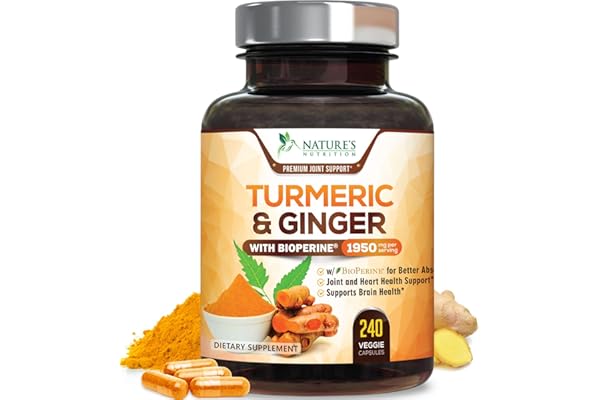
Turmeric Curcumin Supplement 1950mg – 95% Curcuminoids with Organic Turmeric & Ginger, BioPerine Black Pepper for Best Absorption, Nature’s Vegan Joint Support, Non-GMO, Bottled in USA – 240 Capsules
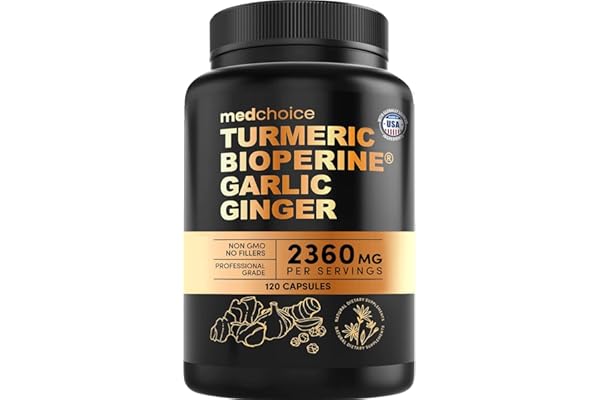
4-in-1 Turmeric and Garlic Supplements with BioPerine – 2360mg Turmeric Ginger Root Capsules with Garlic – High Potency Herbal Blend (120 ct)
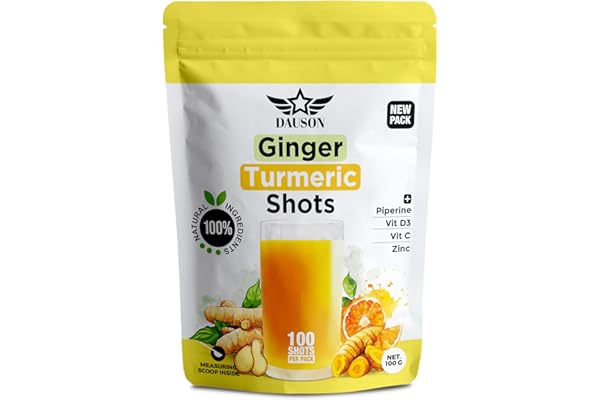
Ginger Turmeric Supplements with Piperine, Vitamin C, Vitamin D3 & Zinc – 100 Servings of Turmeric Ginger Shots for Joint, Heart, Brain, Gut & Skin Health – Ayurved – Powder
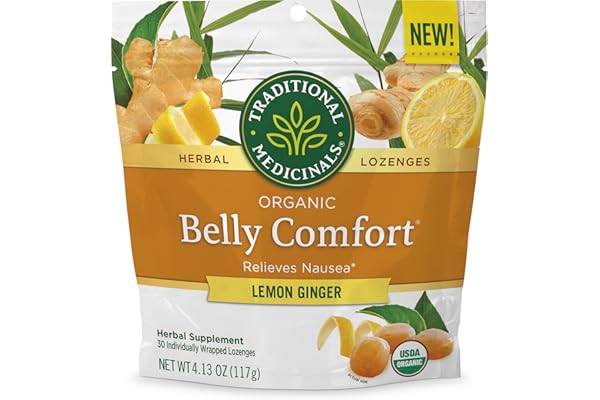
Traditional Medicinals Organic, Belly Comfort Lozenges, Lemon Ginger – Supports Nausea Relief and Occasional Indigestion – Kosher, Non-GMO, Stimulant-Free – 30 Individually Wrapped Lozenges
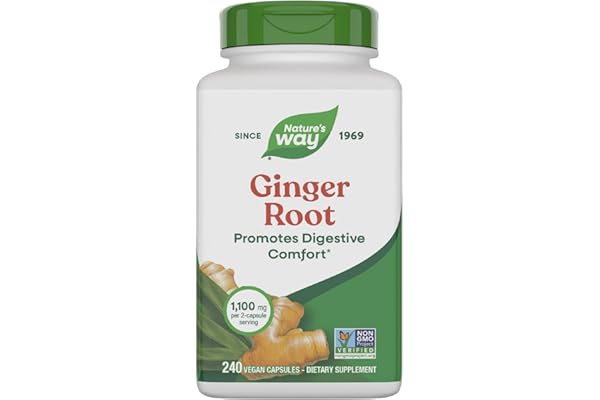
Nature’s Way Ginger Root Capsules 550 mg per capsule, Digestive Comfort* Reduces Motion-Related Nausea*, 1,100 mg per 2 Capsules, Non-GMO Project Verified, Vegan, 240 Count
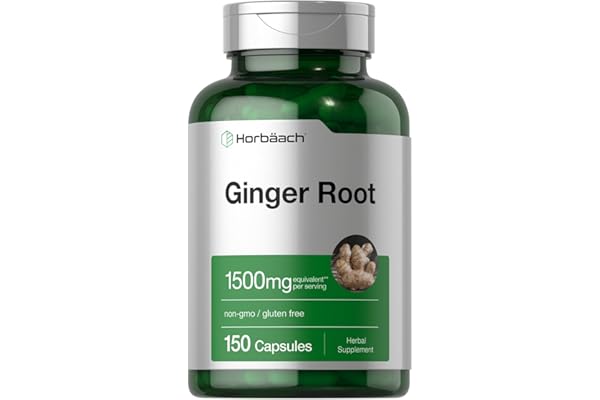
Horbäach Ginger Root Capsules 1500 mg | 150 Pills | Non-GMO, Gluten Free | Ginger Root Extract


